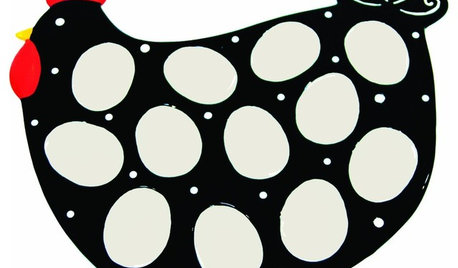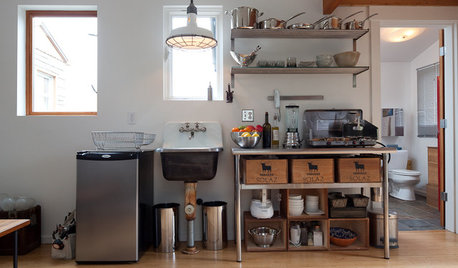How long until eggs go bad for eating?
billc-2007
15 years ago
Related Stories

HOLIDAYS16 Creative Ways to Hide Easter Eggs
Crack of dawn on Sunday not your ideal thinking time? Just follow our creative egg-hiding ideas and pretend Peter Cottontail did the work
Full Story
PRODUCT PICKSGuest Picks: Egg Platters to Keep Those Devils in Their Place
You just might cluck with delight over these perfectly portioned egg plates for Easter and beyond
Full Story
GARDENING AND LANDSCAPINGHow to Make a Pond
You can make an outdoor fish paradise of your own, for less than you might think. But you'll need this expert design wisdom
Full Story
REMODELING GUIDESShould You Stay or Should You Go for a Remodel? 10 Points to Ponder
Consider these renovation realities to help you decide whether to budget for temporary housing
Full Story
HEALTHY HOME12 Ways to Set Up Your Kitchen for Healthy Eating
Making smart food choices is easier when your kitchen is part of your support team
Full Story
CEILINGSIn the Rotation: Ceiling Fans Go Chic
Who Knew Ceiling Fans Could be Lust-Worthy? Here's How to Stay Cool in Style
Full Story
KITCHEN DESIGNFind Your Dining Style: 9 Strategies for Eat-In Kitchens
What kind of seating do you request at a restaurant? It may hold the key to setting up your kitchen table
Full Story
COLORDuck Egg Blue, the Friendliest Color Around
This appealing hue transcends trends, spans styles and gets along with many other colors. Could it be right for one of your rooms?
Full Story
GREEN BUILDINGHouzz Tour: Going Completely Off the Grid in Nova Scotia
Powered by sunshine and built with salvaged materials, this Canadian home is an experiment for green building practices
Full Story
GARDENING AND LANDSCAPINGBid Bad Garden Bugs Goodbye and Usher In the Good
Give ants their marching orders and send mosquitoes moseying, while creating a garden that draws pollinators and helpful eaters
Full Story





kydaylilylady
carmen_grower_2007
Related Professionals
Beavercreek Landscape Architects & Landscape Designers · Middle River Landscape Architects & Landscape Designers · Salem Landscape Architects & Landscape Designers · Allentown Landscape Contractors · Cordele Landscape Contractors · Damascus Landscape Contractors · Edinburg Landscape Contractors · Lyndhurst Landscape Contractors · Golden Valley Landscape Contractors · Crofton Fence Contractors · Fountain Fence Contractors · Green Valley Fence Contractors · Hopkins Fence Contractors · Mebane Decks, Patios & Outdoor Enclosures · North Aurora Decks, Patios & Outdoor Enclosuresgardengalrn
mersiepoo
velvet_sparrow
runningtrails
calliope
seramas
clivemlooker_live_co_uk
runningtrails
dswanson71_gmail_com
dswanson71_gmail_com
jonas302